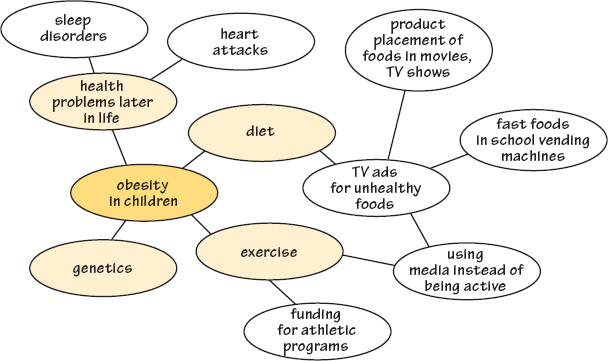Exploring a subject
Instead of plunging into a first draft, experiment with one or more techniques for exploring your subject and discovering your purpose: talking and listening, reading and annotating texts, asking questions, brainstorming, clustering, freewriting, keeping a journal, blogging. Whatever technique you turn to, the goal is the same: to generate ideas that will lead you to a question, a problem, or a topic that you want to explore further.
Talking and listening
Because writing is a process of figuring out what you think about a subject, it can be useful to try out your ideas on other people. Conversation can deepen and refine your ideas even before you begin to draft. By talking and listening to others, you can also discover what they find interesting, what they are curious about, and where they disagree with you. If you are planning to develop an argument, you can try it out on listeners with other points of view.
Many writers begin a writing project by debating a point with friends or chatting with an instructor. Others prefer to record themselves talking through their own thoughts. Some writers exchange ideas by sending e-mails or texts or by posting to a blog. You may be encouraged to share ideas with your classmates in an online workshop, where you can begin to refine your thoughts before starting a draft.
Reading and annotating texts
Reading is an important way to deepen your understanding of a topic, learn from the insights and research of others, and expand your perspective. Annotating a text, written or visual, encourages you to read actively—to highlight key concepts, to note possible contradictions in an argument, or to raise questions for further research and investigation. As you annotate, you record your impressions and begin a conversation with a text and its author. See A1-a for a student’s annotations on an assigned article.
Asking questions
When gathering material for a story, journalists routinely ask themselves Who? What? When? Where? Why? and How? These questions help journalists get started and ensure that they will not overlook an important fact.
Whenever you are writing about ideas, events, or people, asking questions is one way to get started. One student, whose topic was the negative reaction in 1915 to D. W. Griffith’s silent film The Birth of a Nation, began exploring her topic with this set of questions:
- Who objected to the film?
- What were the objections?
- When were the protests first voiced?
- Where were protests most strongly expressed?
- Why did protesters object to the film?
- How did protesters make their views known?
If you are writing in a particular discipline, try to find out which questions its scholars typically explore. Look for clues in assigned readings and class discussions to understand how a discipline’s questions help you grasp its concerns and conventions.
Brainstorming
Brainstorming is a good way to figure out what you know and what questions you have. You begin by listing ideas in the order in which they occur to you. Listing ideas can help a writer narrow a subject and identify a position. An early list is often a source of ideas and a springboard to new ideas. Writers can come back to their brainstorming notes and rearrange them, delete some, or add others.
Clustering
Clustering (sometimes called mapping) highlights relationships among ideas. To cluster ideas, write your subject in the center of a sheet of paper, draw a circle around it, and surround the circle with related ideas connected to it with lines. If some of the satellite ideas lead to more specific clusters, write them down as well. The writer of this cluster diagram was exploring ideas for an essay on obesity in children.
CLUSTER DIAGRAM

Freewriting
In its purest form, freewriting is simply nonstop writing. You set aside ten minutes or so and write whatever comes to mind, without pausing to think about word choice, spelling, or even meaning. Freewriting lets you ask questions without feeling you have to answer them. Sometimes a question that comes to mind at this stage will point you in an unexpected and productive direction.
To explore ideas on a particular topic, consider using a technique called focused freewriting. Again, you write quickly and freely, but this time you focus on a specific subject and pay attention to the connections among your ideas.
Keeping a journal
A journal is a collection of informal, exploratory, sometimes experimental writing. In a journal, often meant for your eyes only, you can take risks. You might freewrite, pose questions, comment on an interesting idea from one of your classes, or keep a list of questions that occur to you while reading. You might imagine a conversation between yourself and your readers or stage a debate to understand opposing positions. A journal can also serve as a sourcebook of ideas for future essays.
Blogging
Although a blog is a type of journal, it is a public writing space rather than a private one. In a blog, you might express opinions, make observations, recap events, play with language, or interpret an image. You can explore an idea for a paper by writing posts from different angles. Since most blogs have a commenting feature, you can create a conversation by inviting readers to give you feedback—ask questions, pose counterarguments, or suggest other sources on a topic.